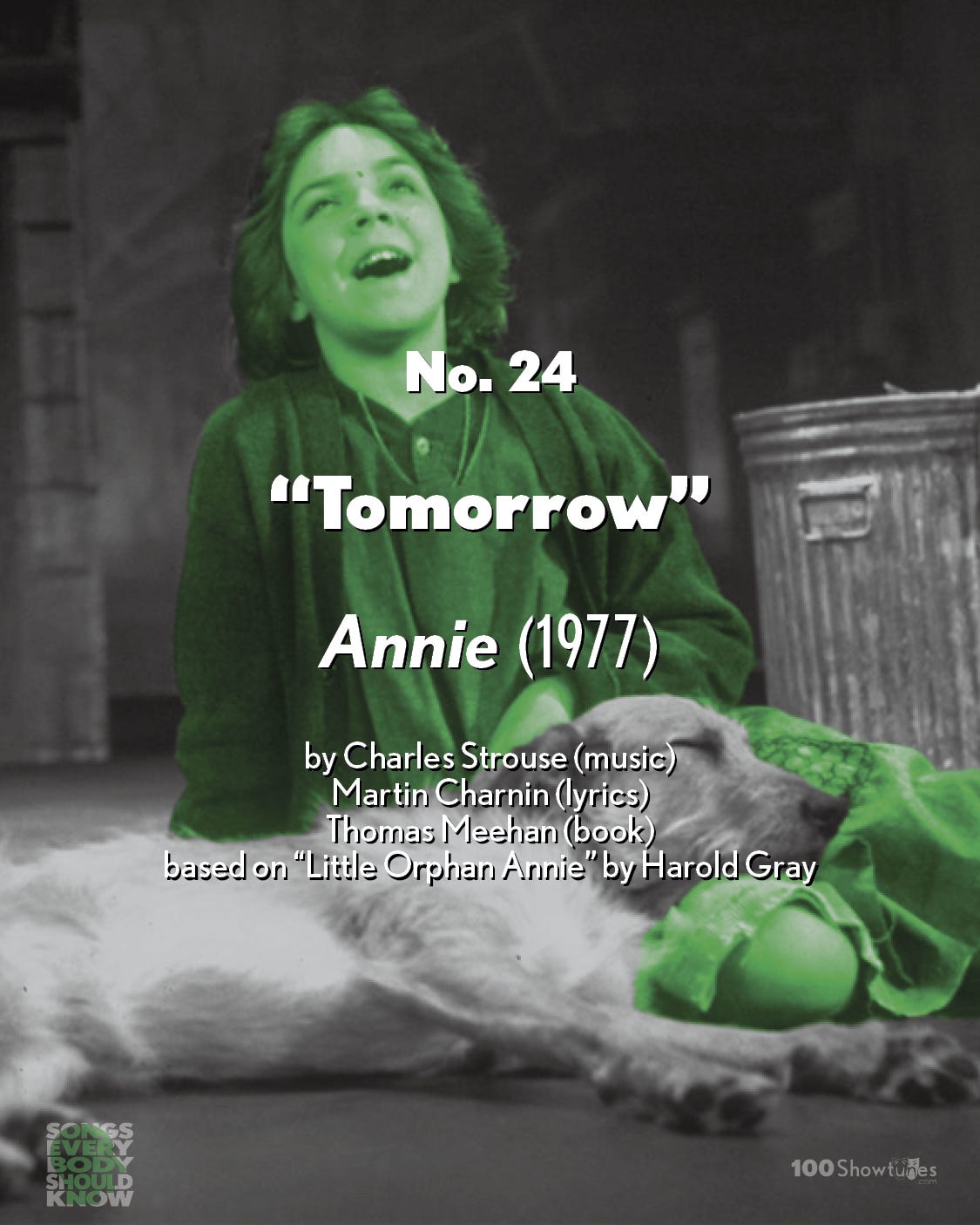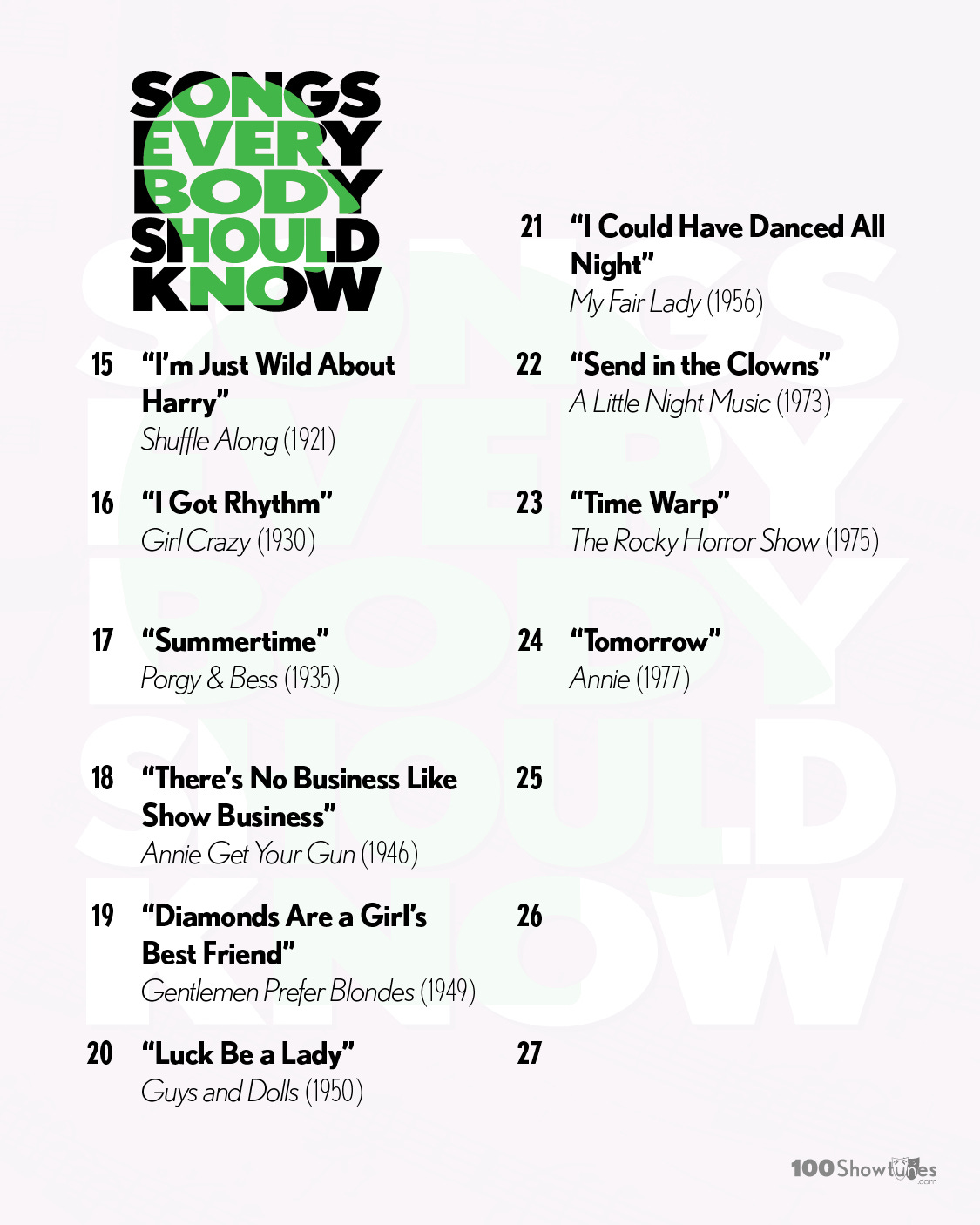No. 24. “Tomorrow”
ANNIE (1977). By Charles Strouse (music), Martin Charnin (lyrics), and Thomas Meehan (book). Based on “Little Orphan Annie” by Harold Gray
Summer 1977. You’re at Annie, a smash hit new musical. You are dimly aware of the comic strip on which it is based, but you’re not here for what future generations would call “IP Expansion,” you’re here because you’ve heard this is an honest-to-goodness old-fashioned Golden-Age Musical. You’ve enjoyed the intellectual, often cynical, Concept Musicals that have dominated the decade, but it’s nice to see something warmer and more optimistic. The house lights dim, and a beautiful French horn duet turns into one of the best overtures you’ve heard in some time. Then you meet a Depression-era orphan—the titular Annie—singing a plaintive plea for a reunion with her birth parents. This isn’t a cloying, cutesy child. As played by phenom Andrea McArdle, Annie is streetwise, tough, and can outbelt anyone on Broadway. Her orphanage is run by a demented alcoholic named Miss Hannigan. The setting so far is pretty dark, when you think about it, but Dorothy Loudon’s riotous Hannigan (not to mention Thomas Meehan’s snappy book and the melodious score by Charles Strouse and Martin Charnin) keeps things firmly in comedic territory. Soon, Annie escapes the orphanage in a laundry bin and befriends as similarly orphaned dog (Sandy) on the street. (There’s a real live trained dog on that stage!) Despite limited prospects, Annie encourages Sandy (and herself, and us) to believe that things will be better “Tomorrow.”
Martin Charnin conceived of Annie during Nixon-era 1970s as an antidote to the dark news of the day (Watergate, the Vietnam war, etc.) In doing so, he completely inverted the politics of the original comic1—Harold Gray’s Annie and Warbucks were staunchly conservative and anti-New Deal whereas Charnin’s has a number mocking Herbert Hoover and leads a reprise of “Tomorrow” with F.D.R.. That’s right kids, Annie went woke, an she did it before it was cool. By the time the musical was on Broadway, the news was a bit happier (Carter was elected, we were out of Vietnam, etc.), and that optimistic redhead was more a reflection of the changing tide. Annie—an it’s signature song, “Tomorrow”—are often dismissed as being overly precious. Considering how frequently (and often disastrously) people have tried to “fix” Annie since its original production, you’d think that reputation would be well-founded. But Thomas Meehan’s book finds a compelling relationship arc between the Stern (and wealthy) Daddy Warbucks and the plucky Annie, surrounding them with period details and colorful characters. The Strouse-Charnin score captures the spirit of the Golden Age Musical and the flavor of its setting with just enough of a modern sensibility to feel relevant. So while today Anniemight feel like an opportunity for your local theater to print money, it’s also a darn good show that—if done well—is worth your time.
Recommended Recording: ”Tomorrow,” Annie (1977 Original Broadway Cast)
Andrea McArdle has been singing “Tomorrow” for nearly 50 years. She was originally cast as one of the other orphans during the show’s developmental production at the Goodspeed Opera House in Connecticut. The creative team soon realized the young woman they had cast in the title role was too sweet and perky, so they fired her and promoted McArdle. Her attitude really comes through on this recording. The OBCR is the 18th highest selling cast recording of all time, receiving Platinum Certification in 1980. (Decades later, McArdle sings a simple arrangement of “Tomorrow” paired with “Look to the Silver Lining” as part of the television concert My Favorite Broadway: The Leading Ladies.)
Alternate Performances
Annie has received ~ 65 cast recordings, including Argentinian, Australia, Danish, Dutch, German, , Israeli, Italian, so many Japanese, London, Madrid, Mexican, Norwegian, Peruvian, and Portuguese casts. It’s also received four screen adaptations. The most recent (and most faithful to the original script and score) was 2021’s Annie Live!. It’s been revived twice on Broadway, with only the 2012 cast getting recorded. “Tomorrow” has been covered many many times, but the best is Grace Jones’ utterly fantastic disco version.
1982 Film - John Huston directed the first attempt to bring Annie to screen. Unknown Aileen Quinn plays the title role, supported by an embarrassment of riches including Carol Burnett, Bernadette Peters, Tim Curry, Albert Finney, Ann Reinking, and Geoffrey Holder. Charnin, Strouse, and Meehan took a big payday to relinquish any sort of creative control, and neither director Huston nor producer Ray Stark seemed to understand or even like the material. So the great cast and production design are overshadowed by a series of baffling decisions (like cutting the main presentation of “Tomorrow” leaving only the F.D.R. Reprise, or replacing the great “NYC” with the forgettable “Let’s Go to the Movies”). The cast and what is left untouched of the original material give the movie sentimental appeal, but even its most ardent fans know it’s not really correct.
1999 TV Production - Directed by Rob Marshall, This is all-around the best Annie on screen. It trusts and loves the material, if it does trim the score a bit a simplifies the story. Unknown Alicia Morton plays Annie; Kathy Bates chews the scenery as Hannigan with Alan Cumming and Kristin Chenoweth as her accomplices; Victor Garber puts the Daddy in Daddy Warbucks; and Audra McDonald shines as Grace—Warbuck’s executive secretary. Andrea McArdle gets a fun cameo as the Star to Be in the song “NYC.”
2014 Film - A 2014 adaptation of Annie updates the action to the present day with Jamie Foxx as Warbucks and Quvenzhané Wallis as the optimistic orphan—certainly the first Oscar nominee to star in a major production of Annie! Sia heavily adapted the score, rewriting the most popular songs and adding a number of entirely new numbers. The result is…weird. But I really rather enjoyed it when I saw it in theaters. Maybe I was just having a lot of feelings that day? I’ve been afraid to rewatch.
Is it Covered by The Rat Pack, Audra McDonald, or Glee?
Audra McDonald- The 1999 TV Annie cuts the FDR reprise of “Tomorrow”. Instead, they give Audra McDonald a new reprise of “Tomorrow” (interpolating some of opening number “Maybe”). It is the most comforting 2 minutes ever to have been recorded, and the world would be a better place if everyone on earth listened to it every morning.
Glee has used three different Annie songs (in three different episodes), but not “Tomorow.” Kurt (Chris Colfer) and Rachel (Lea Michele) sing “You’re Never Fully Dressed Without a Smile” in a mash-up with “The Way You Look Tonight” as they raid a vogue closet and dress each other. appears in season 4 episode 3 (“Makeover”). Jane Lynch—who did a stint as Hannigan in the 2012 revival—sings “Little Girls” in season 4, episode 20 (“Lights Out”). She also sings “NYC” (along with Matthew Morrison) in, season 5 episode 14 (“Opening Night”).
In the Wings
It’s hard to believe, but we will be 25% through the 100 Showtunes next week! Until then, there’s a ton of Annie bonus material.
Look up “Joanna Pacitti Annie Lawsuit.” Suffice it to say, Andrea McArdle may have been the first actress to play Annie when the producers fired their first choice, but she certainly wasn’t the last!
Watch the fantastic documentary Life After Tomorrow. It’s a glimpse into the lives of all the young Annies/orphans (including former Annie Sara Jessica Parker) who had a momentary brush with fame when they appeared in the original Broadway production, and their difficulty in returning to “normal” life afterwards.
The very fun podcast Broadway Bound (about musicals that DIDN’T make it to Broadway) has a great episode about the ill-fated Annie 2: Miss Hannigan’s Revenge. And yes, in keeping with tradition, a little girl playing Annie is fired.




